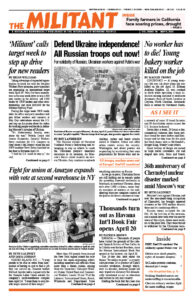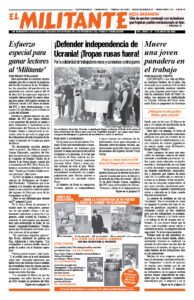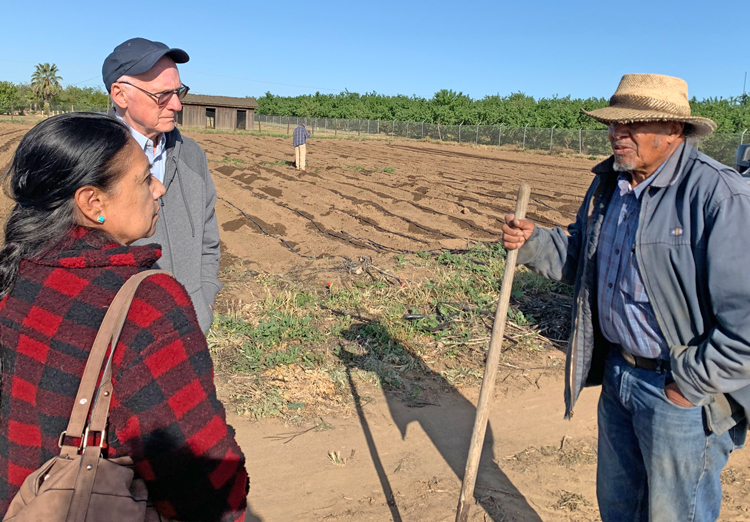FRESNO, Calif. — Farmer Will Scott invited Socialist Workers Party candidates Ellie García and Joel Britton to his farm here April 5 to discuss how small farmers are affected by sharply rising prices, Moscow’s war in Ukraine and what workers and farmers can do to begin changing the conditions we face.
Scott is president of the African American Farmers of California. Black families have been farming in the San Joaquin Valley for more than 100 years. García is running for U.S. Senate from California and Britton is the party’s candidate for governor. Britton and this worker-correspondent returned for more discussion April 13.
Scott first met members of the SWP at a conference of Hmong farmers in 2012. He attended the event to further work among immigrant farmers from Laos, who face many of the same challenges as all small farmers.
Okra, purple hull beans, black-eyed and crowder peas, tomatoes and various kinds of peppers are among the many crops Scott grows on his 45 acres. Crops planted in recent weeks will be harvested this summer before a second planting.
A yearslong drought has hit small farmers especially hard.
“My well went dry,” Scott said. “Big farmers with almond trees dig their wells deep. They used my water by digging so deep that I ran out.
“Paul Buxman, a white farmer who raises peaches and is also an artist, organized to raise money so we could dig to 300 feet. It was $50-a-foot donation and you got one of his lithographs.”
“That was quite an act of solidarity,” García said.
“It was a godsend,” Scott replied. “If the farmer has no water, he’s not a farmer, just a person with land. I know farmers who can’t farm. Farmers are gouged by the people who drill wells. For another well earlier, I paid $14,000 to drill down 300 feet; today that would cost three times as much.”
Scott, now 81, said his family had been sharecroppers in Oklahoma before moving here. “I was a farmworker. I cut grapes. I know what it is to be a worker,” he said. Drafted by the army during the Vietnam War, he enlisted in the navy. For many years he worked as an engineer at a utility company until retiring at 53 years old, when he took up farming full time.
“I still work with Hmong, Latino and Nisei [Japanese American] farmers,” Scott said. “Small farmers need to tell their story.” The price farmers receive for what they produce is an example. “If we organize, we can be compensated more.”
Farmers went to the state Capitol to meet with legislators. “There was discussion in the legislative Black Caucus and they said they would come to the farms to see the current conditions, but they didn’t,” Scott said.
García said Republicans and Democrats both represent the capitalist rulers. “We are for forging an independent movement of workers to build a labor party based on the unions. We need to be able to fight as a class. Eventually we’ll have to take power from the rulers and establish a workers and farmers government like working people did in Cuba,” she said.
“I’m a Democrat,” Scott responded. “But I’d say they’re no different than Republicans.” Workers and farmers need to defend themselves and “talk and spread the word.”
Workers and farmers need an alliance, García added. She described the powerful impact on her of struggles by farmers to prevent foreclosures in the early 1980s in the Midwest. Black and Caucasian farmers fought side by side to hold on to their land and were joined by trade unionists from across the region. They held joint rallies with striking steelworkers and organized food donations for miners hit by massive layoffs. The SWP joined these struggles.
Working farmers hit by inflation
García pointed to the party’s March 3 statement defending Ukraine’s independence, calling for the defeat of Moscow’s invasion, the immediate withdrawal of U.S. troops and nuclear arms from Europe and an end to sanctions on Russia. “U.S. sanctions come down hardest on the working people in Russia,” she said.
“The war has been disastrous for us too,” Scott responded. “Fuel costs have almost tripled. I have two tractors that use diesel. It costs me $100 to fill my truck and go to the Oakland farmers market and back.”
Scott said he wasn’t sure sanctions against Russia should be lifted. “If people had to face empty grocery shelves,” he said, maybe they’d rise up against Putin.
“If working people in this and other countries could force an end to the sanctions,” Britton said, that would create better conditions for working people in Russia to organize, defend themselves, reach out to their working-class neighbors and broaden opposition to Putin’s war.
Scott didn’t say he agreed, but he liked hearing things he’d never heard. He described his own experience in the U.S. Army in Vietnam. “I went there thinking I was fighting for democracy, when I didn’t even have it here,” he said.
Britton pointed to labor struggles taking place today, describing his visit to the picket line of oil refinery workers at Chevron in Richmond, where bosses locked out workers on the eve of their strike.
Scott described the challenges facing farmers who are African American. “Ninety percent of the land of Black farmers has been taken,” he said. For decades African American farmers have faced discriminatory practices from the U.S. Department of Agriculture, which denied them loans.
“They should do some kind of redress and move on. Black and poor white farmers need the same opportunities as rich farmers,” Scott said. Working farmers across the U.S. face big challenges today, with farm income falling 7.9% in the past year, the USDA reports.
The alliance of workers and farmers forged during Cuba’s socialist revolution provides a powerful example, Britton said. They took political power out of the hands of the capitalist class and established their own government. “Land reforms in 1959 and 1963 were crucial steps on the road to ending capitalist exploitation,” he said. “Landless peasants got land, cooperatives were formed, sugar plantations became state farms.”
By nationalizing the land, the revolutionary government prevented it from being used as a commodity to be sold at a profit, and guaranteed no farmer could be foreclosed on. Nationalization of the land is the foundation for abolishing the rents and mortgages system here too. That’s why it’s part of the program the SWP presents today, Britton said.
“You’re exposing me to other people’s experiences, so it’s not ‘poor me,’ but we need to organize,” Scott noted. He invited the SWP members to return in the summer when crops will be ready for harvest.


